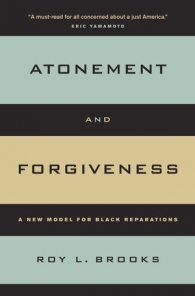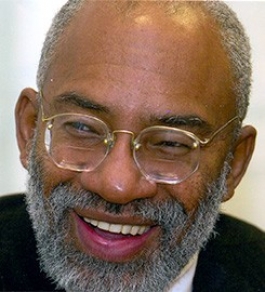- Atonement and Forgiveness
- Roy L. Brooks
- University of California Press
- Boris L. Bittker
- Golden Hill section of San Diego
- Ruth Bader Ginsburg
- Stephen Breyer
- Jim Crow
- black reparations
- Rep. Sheila Jackson Lee
- Senator Cory Booker
- Chief Justice Roger Taney
- Marianne Williamson
- Dred Scott v. Sanford
- Susan Neiman
- Learning From the Germans: Race and Memory of Evil
- Rosanna Arquette

ATONEMENT AND FORGIVENESS: A NEW MODEL FOR BLACK REPARATIONS, by Roy L. Brooks (University of California Press, Berkeley and Los Angeles, California, 2004, 325 pages).
Book Review by Dennis Moore
“In my Case for Black Reparations, published in 1973, I called for a national debate on this painful subject. Professor Brooks has responded magnificently to this appeal, with a comprehensive and painstakingly thoughtful analysis of all aspects of this area. His book, in my opinion, will certainly become the standard examination of the issue. I recommend it with unqualified enthusiasm.”
- Boris I. Bittker, Professor Emeritus of Law, Yale University
 August 15, 2019 (San Diego) - Roy L. Brooks, Warren Distinguished Professor of Law at the University of San Diego, and author of over a dozen books, including When Sorry Isn’t Enough: The Controversy over Apologies and Reparations for Human Injustice (1996), has written this thoughtful and provocative book, Atonement and Forgiveness: A New Model for Black Reparations, that has renewed a long simmering debate.
August 15, 2019 (San Diego) - Roy L. Brooks, Warren Distinguished Professor of Law at the University of San Diego, and author of over a dozen books, including When Sorry Isn’t Enough: The Controversy over Apologies and Reparations for Human Injustice (1996), has written this thoughtful and provocative book, Atonement and Forgiveness: A New Model for Black Reparations, that has renewed a long simmering debate.
Brooks jumps into this debate right away in the preface of his book by stating: “When a government commits an atrocity against an innocent people, it has, at the very least, a moral obligation to apologize and to make that apology believable by doing something tangible called a ‘reparation.’ The government of the United States committed atrocities against black Americans for two and one-quarter centuries in the form of chattel slavery and for an additional one hundred years in the form of Jim Crow – what Supreme Court Justices Ruth Bader Ginsburg and Stephen Breyer refer to as ‘a law-enforced racial caste system’ – and it has not even tendered an apology for either. The U.S. government should, in fact, atone – that is, both apologize and provide reparations – for racial slavery and apartheid. Saying ‘I’m sorry’ just isn’t enough.”
The “atrocity against an innocent people” that the author talks about in his book is graphically depicted in the attached video of a professor at Emory University in Atlanta here.
The aforementioned and referenced Professor Emeritus of Law, Boris I Bittker, who clearly endorses Atonement and Forgiveness, would be disappointed as to how we have regressed on the subject of black reparations, as it has now become a contentious debate.
Professor Brooks has a profound passage in Atonement and Forgiveness which is at the heart of the reparations debate: “A vivid illustration of the nexus between black net worth and prior regimes of racial subordination can be seen in the life story of Reverend George Walker Smith, a local hero in San Diego. In December 2000, Reverend Smith gave an interview on the occasion of his retirement as minister of the Christ Presbyterian Church in the Golden Hill section of San Diego. Reverend Smith, who had become the leading black figure in San Diego, talked about his background. ‘I grew up on a backwoods Alabama plantation where African Americans worked the fields [while] the white family in the big house got rich.’ Elaborating on his life in Alabama, the 71-year-old minister said: ‘A rabbit had a better chance than black folks. At least there’s a season when you can kill rabbits. But for niggers the season was year round.’ Reverend Smith also spoke of other aspects of his formative years in the South, saying: ‘If you white folks were coming down the sidewalk and I was meeting you, I had to immediately jump in the street and give you the sidewalk. To me this is humiliating.’”
Professor Brooks further stated in this profound passage in Atonement and Forgiveness in regard to Reverend Smith: “What Reverend Smith experienced was the legacy of slavery, even though the dSixty-four years after slavery, there were plenty of former slaves still around. But Reverend Smith did not only know former slaves; he felt the lingering effects of slavery. Racial fault lines laid down during slavery and perpetuated during Jim Crow diminished not only Reverend Smith’s chances for worldly success and personal happiness, but also the lives of his descendants. Reverend Smith’s children and grand-children inherited a social virus that diminishes their power, wealth, and privileges. Their ancestors contracted the virus during slavery, and through generational transmission, they now have it themselves.”
The New York Times Magazine recently chronicled the arrival of the first slaves from Africa to Virginia in 1619 in what is described as "The 1619 Project." The goal of The 1619 Project, a major initiative of The New York Times Magazine is to reframe history in its proper perspective, as indicated here.
The painful history and legacy of slavery and racism is demonstrated in the art and music of people like Billie Holiday, in her iconic song Strange Fruit here, and Nina Simone’s song written almost immediately after the murder of Medgar Edgars and the 4 young girls murder at a church in Alabama here.
The author indicates in Atonement and Forgiveness that in 1989, and in each year thereafter, then Congressman John Conyers submitted a slave redress bill in Congress. Given the name H.R. 40 in recognition of the government’s broken promise of “forty acres and a mule”, this bill Calls for the creation of a commission to study the question of slave redress.
Ironically, and some 15 years after Professor Brooks’ initial publication of Atonement and Forgiveness in 2004, he writes an OP-ED in the Los Angeles Times dated April 24, 2019, referencing the latest versions of H.R. 40 sponsored by Rep. Sheila Jackson Lee (D-Texas); Sen. Cory Booker introduced parallel legislation in the Senate. In a Democratic Presidential debate on July 30, 2019, Presidential candidate Beto O’Rourke stated that if he became President he would sign the bill into law. Another Democratic candidate in the same debate, Marianne Williamson, stated that she believes blacks should receive 200 to 500 billion in slave reparations, and she went into detail on a national stage to explain why.
 Marianne Williamson further stated in regard to a question by one of the moderators: “It’s not $500 billion in ‘financial assistance’ – it’s $200 to $500 billion payment of a debt that is owed.” She went on to say that the country needed “deep truth-telling” when it came to the issue of race, and that the economic gap between black and white Americans “comes from a great injustice that has never been dealt with.” This seems to be exactly what Professor Brooks is saying in Atonement and Forgiveness.
Marianne Williamson further stated in regard to a question by one of the moderators: “It’s not $500 billion in ‘financial assistance’ – it’s $200 to $500 billion payment of a debt that is owed.” She went on to say that the country needed “deep truth-telling” when it came to the issue of race, and that the economic gap between black and white Americans “comes from a great injustice that has never been dealt with.” This seems to be exactly what Professor Brooks is saying in Atonement and Forgiveness.
The $200 billion to $500 billion figure, Williamson went on to explain, came from the Civil War – era promise of reparations in the form of “40 acres and a mule” made to former slaves, multiplied by the number of slaves at the time – between 4 million and 5 million.
CNN analyst Athena Jones weighed in on Williamson’s revelation about reparations by stating: “This race talk is remarkable. Beto talks about the U.S. being built on the backs of kidnapped slaves. Marianne Williamson mentions ’40 acres and a mule in talking about her support for reparations. I don’t think I’ve ever heard ’40 acres and a mule’ on the debate stage before.”
Professor Brooks makes another, of many, profound statements in his book by stating: “No fewer than five provisions of the Constitution directly accept and protect slavery. Article I, Section 2, Paragraph 3 (the ‘three-fifths clause’) counted only three-fifths of a slave in determining a state’s population for purposes of congressional representation and any ‘direct taxes.’ Article I, Section 9, Paragraph I (the ‘slave-trade clause’) prevented Congress from ending the slave trade before the year 1808, but did require Congress to ban it after that date. Article I, Section 9, Paragraph 4 ensured that a slave would be counted three-fifths of a white person if a head tax were ever levied. Article V, Section 2, Paragraph 3 (the ‘fugitive-slave clause’) required the return of fugitive slaves to their owners ‘on demand.’ And, finally, Article V prohibited Congress from amending the slave-trade clause before 1808.”
Also profound and relevant, is Professor Brooks quoting Chief Justice Roger Taney in the Dred Scott v. Sanford (1857) case: “determined that blacks were ‘regarded as beings of an inferior order … unfit to associate with the white race’ and, as such, ‘they had no rights which the white man was bound to respect.’ Accordingly, the Court ruled, ‘the negro might justly and lawfully be reduced to slavery for his benefit.’”
Professor Brooks alludes to the guilt and shame that many whites feel for their roles in the slavery and subjugation of blacks. Typical is a recent admission and revelation made by actress Rosanna Arquette, of Desperately Seeking Susan and Pulp Fiction fame. Arquette states: “I’m sorry I was born white and privileged. It disgusts me. And I feel so much shame.” Needless to say, there are probably many whites that feel similarly, and the author offers in Atonement and Forgiveness a recourse for those feelings.
Arquette – whose siblings include actors Patricia, David and the late Alexis Arquette – faced ridicule from conservative commenters thanks in part to far-right outlet Breitbart New’s coverage of her statement.
The premise of Professor Brooks’ call for slave reparations in codified in Major General William T. Sherman’s Special Field Order No. 15, issued January 16, 1865, in the form of “forty acres and a mule.” The promise of “forty acres and a mule” was never fulfilled. In a subsequent lawsuit, a federal district judge, Paul L. Friedman, explained what happened:
“Forty acres and a mule. As the Civil War drew to a close, the United States government created the Freedman’s Bureau to provide assistance to former slaves. The government promised to sell or lease to farmers parcels of unoccupied land and land that had been confiscated by the Union during the war, and it promised the loan of a federal government mule to plow that land. Some African Americans took advantage of these programs and either bought or leased parcels of land. During reconstruction, however, President Andrew Johnson vetoed a bill to enlarge the powers and activities of the Freedman’s Bureau, and he reversed many of the policies of the Bureau. Much of the promised land that had been leased to African American farmers [approximately 400,000 acres to about 40,000 ex-slaves] was taken away and returned to Confederate loyalists. For most African Americans, the promise of forty acres and a mule was never kept.”
 The author further points out in Atonement and Forgiveness that despite the government’s failure to live up to its promise, African-American farmers persevered. By 1910, they had acquired approximately 16 million acres of farmland. By 1920, there were 925,000 African-American farms in the United States.
The author further points out in Atonement and Forgiveness that despite the government’s failure to live up to its promise, African-American farmers persevered. By 1910, they had acquired approximately 16 million acres of farmland. By 1920, there were 925,000 African-American farms in the United States.
Susan Neiman, born as a white girl in the segregated south, spent most of her adulthood as a Jewish woman in Berlin – currently as director of the Einstein Forum in Germany. This double perspective has fueled her resolve to explore America’s fraught relationship with history, following in the footsteps of Professor Brook’s pursuit of racial redress and reparations.
 Neiman’s latest book; Learning from the Germans: Race and the Memory of Evil, raises similar points and arguments for reparations as does Brooks in his Atonement and Forgiveness. She points out a comment and revelation made by a Katrina Browne, whose family traded slaves, at the recent Congressional hearing on reparations; “It is good for the soul of a person, a people and a nation to set things right.”
Neiman’s latest book; Learning from the Germans: Race and the Memory of Evil, raises similar points and arguments for reparations as does Brooks in his Atonement and Forgiveness. She points out a comment and revelation made by a Katrina Browne, whose family traded slaves, at the recent Congressional hearing on reparations; “It is good for the soul of a person, a people and a nation to set things right.”
 Neiman concluded by stating: “We must urge Congress to pass HR 40 so that our engagement with the past will deepen, and bear fruit.” She titled an OP-ED in the Los Angeles Times, dated July 21, 2019; “Germany paid reparations. Will the U.S.?”
Neiman concluded by stating: “We must urge Congress to pass HR 40 so that our engagement with the past will deepen, and bear fruit.” She titled an OP-ED in the Los Angeles Times, dated July 21, 2019; “Germany paid reparations. Will the U.S.?”
Professor Brooks gives food for thought in this provocative and groundbreaking book, Atonement and Forgiveness, a book that I highly recommend.
 Dennis Moore has been the Associate Editor of the East County Magazine in San Diego and the book review editor of SDWriteway, an online newsletter for writers in San Diego that has partnered with the East County Magazine, as well as a freelance contributor to EURweb based out of Los Angeles. Mr. Moore can be contacted at contractsagency@gmail.com or you can follow him on Twitter at: @DennisMoore8.
Dennis Moore has been the Associate Editor of the East County Magazine in San Diego and the book review editor of SDWriteway, an online newsletter for writers in San Diego that has partnered with the East County Magazine, as well as a freelance contributor to EURweb based out of Los Angeles. Mr. Moore can be contacted at contractsagency@gmail.com or you can follow him on Twitter at: @DennisMoore8.







Comments
Atonement and Forgiveness
The New York Times Magazine "1619 Project"
Carole, in answer to your question; "Who are you forgiving?" it is the author himself who is indicating who is to be forgiven, as Professor Roy L. Brooks states in his book: "Civic forgiveness is crucial for black progress in our society. There is understandably, deep and long-standing resentment by blacks toward whites and 'the system' for racial injustice. Blacks did not come to this country of our own free will, and we cannot return to the place from whence we were stolen. We are here to stay. But if the federal government atones for slavery and Jim Crow, we must fully commit ourselves to a process of racial reconciliation. If the federal government's apology and reparations are substantial, then there is no reason for us to withhold forgiveness. My argument, then. comes down to this: meaningful reparations render the apology believable and produce a redemption effect; and meaningful reparations induce civic forgiveness and make racial reconciliation possible. Atonement (apology plus reparations) and forgiveness foster racial reconciliation. Viewed in this forward-looking way, slave redress provides Americans on both sides of the color line with a rare opportunity - a third Reconstruction - to finish building the palace of justice that the civil rights movement began." The New York Times Magazine "1619 Project", recognizing black's 400 year anniversary in coming to America on slave ships, puts this in perspective here.
Forty Acres and A Mule: Saying ‘I’m sorry’ just isn’t enough.”
DEMANDING REPARATIONS FOR LOS ANGELES SHERIFF DEPUTY GANG
Reparations comes in all forms! Last night I attended a "Cancel the Contract" community activist forum here in Lancaster, in which on the back of the agenda it stated "DEMANDING REPARATIONS FOR LOS ANGELES SHERIFF DEPUTY GANG VIOLENCE". It seems that here in Los Angeles County, and particularly here in Lnacaster, the theme of Los Angeles Sheriff Deputy violence against ordinary citizens is rampant. As a matter of fact, last night on the agenda there was a "Police Brutality Update", in which the "Cancel the Contract" community activist organization here in Lancaster gave an update on the black elderly woman that was assaulted by a Los Angeles Sheriff Deputy at the WinCo store, just walking distance from where I live. In further regard to the upcoming panel discussion at the Loyola Law School on September 8-10, 2023, regarding Los Angeles Sheriff Gang Violence, I am familiar with two of the paneleists, Cerise Castle of KnockLA and Lesley McSpadden, the mother of the deceased Michael Brown in St. Louis. I actually had the honor of written a book review by Lesley McSpaden in the East County Magazine. Her story is gut wrenching about the death of her son!
Alex Vitale, Police and Social Justice Project, Brooklyn College
I have just been informed earlier today, that Alex Vitale, of the Police and Social Just Project, Brooklyn College, will break bread with the Lancaster social activist organization; "Cancel the Contract" starting at 6:00PM today. Also, Mr. Vitale will be a guest panelist at the "Demanding Reparations For Los Angeles Sheriff Deputy Gang Violence" at Loyola Law School in Los Angeles on September 8-10, 2023. See attached here.
Join Professor Alex Vitale in a community discussion
Professor Alex Vitale will participate in a community discussion today at the headquarters of "Cancel the Contract" in Lancaster. See here.
Forty Acres and A Mule: Saying ‘I’m sorry’ just isn’t enough.”
Reparations - Trymaine Lee Podcast -"Uncounted Millions"
Trymaine Lee, who is a contributor on MSNBC, has raised the ongoing debate about reparations wih his podast "Into America - Uncounted Millions", in which he explores the success of a former slave Gabriel Coakley buying his freedom, then buying the freedom of his wife and family in the attached chapter of the podcast.
Reparations - Trymaine Lee Podcast -"Uncounted Millions"
Trymaine Lee, who is a contributor on MSNBC, has raised the ongoing debate about reparations wih his podast "Into America - Uncounted Millions", in which he explores the success of a former slave Gabriel Coakley buying his freedom, then buying the freedom of his wife and family in the attached chapter of the podcast.
Buying the Black vote...
DeplorableGirl, read the book!
DeplorableGirl, you should read the book before you make the conclusions that you have in your comment! You will see that reparations were actually made to the Jews by Germany, more than $89 billion. You will also read that in 1988 President Reagan signed the Civil Liberties Act that issued a government apology for removal and internment of Japanese and backed the apology with reparations consisting of, inter alia, $20,000 for each former internee and a scholarship fund. And, of course, Native Americans received reparations. Also, is you are really interested in getting closer to the truth and fairness, you should attend the speaking engagement of the referenced author in my review of Susan Neiman in San Diego on October 3, 2019, at UCSD. As indicated near the end of my review, she is the Director of the Einstein Forum in Germany, and the author of the book; "Learning from the Germans: Race and the Memory of Evil." She wrote an OP-ED in the Los Angeles Times titled; "Germany paid reparations. Will the U.S?" at the end of her OP-ED she stated: "We must urge Congress to pass HR 40 so that our engagement with the past will deepen, and bear fruit." Assuming that you live in the San Diego area, I strongly encourage you to attend this event.
Atonement
The Clotilda was the last ship to transport enslaved Africans.
The wreck of the Clotilda, the last ship to transport enslaved Africans to the United States, sits entombed in mud at the bottom of the Mobile River in Alabama, according to an OP-ED by Ben Raines in the Los Angeles Times dated July 21, 2019. Raines points out that the Clotilda presents a one-of-a-kind opportunity to bring to life the nation's slave-era history. It can also highlight the story of Africatown, the only community in the nation founded and ruled by African-born slaves, where many of the Clotilda captives lived out their days and where their descendants reside. The Africatown story is one of exceptional resilience. The 110 captives on the Clotilda were kidnapped by the king of Dahomey, who ruled what is modern-day Benin in West Africa and ran a brisk business selling his fellow Africans into bondage. These Africans, captured from various tribes by the Dahomean army, were sold and brought to Alabama by Timothy Meaher, a plantation and steamboat owner in Mobile. Cudjoe Lewis, pictured here, was the last surviving person brought over on the Clotilda.